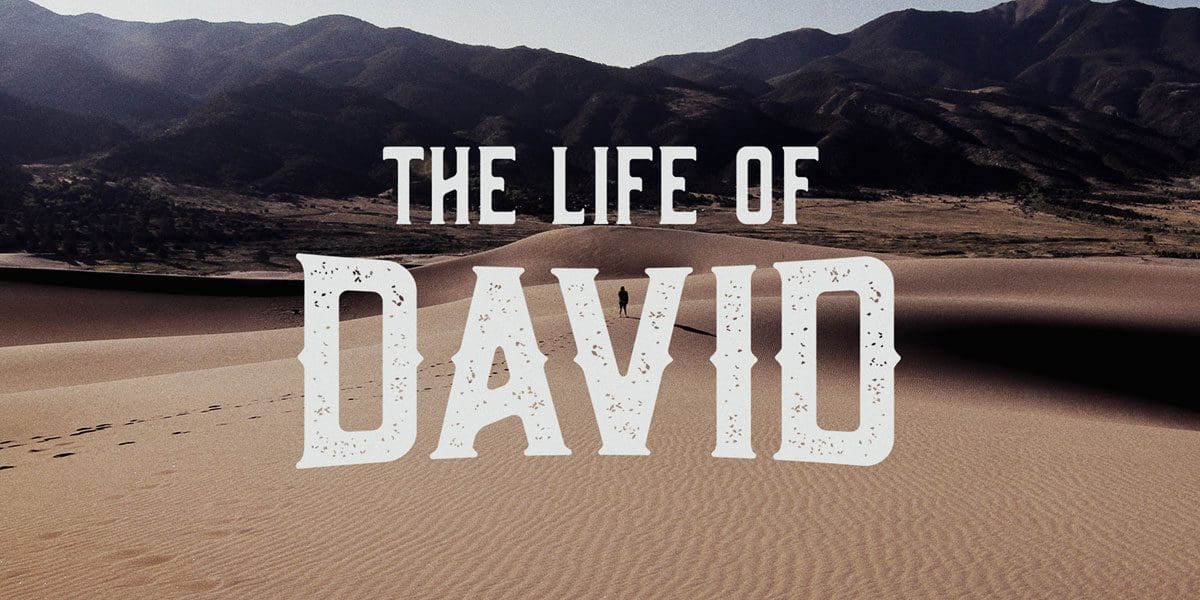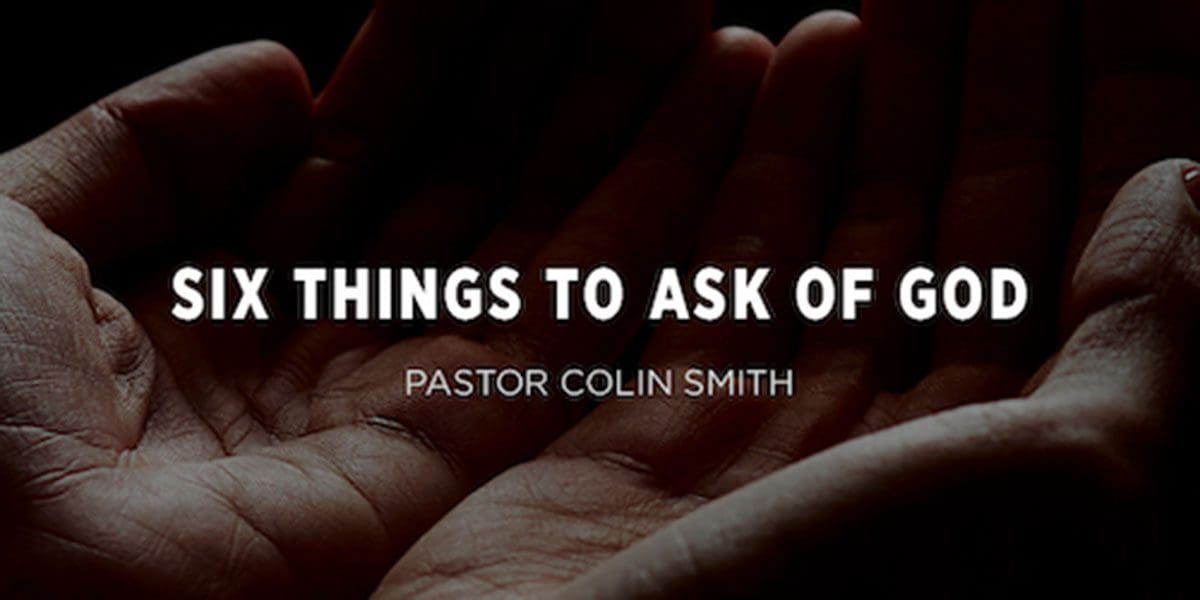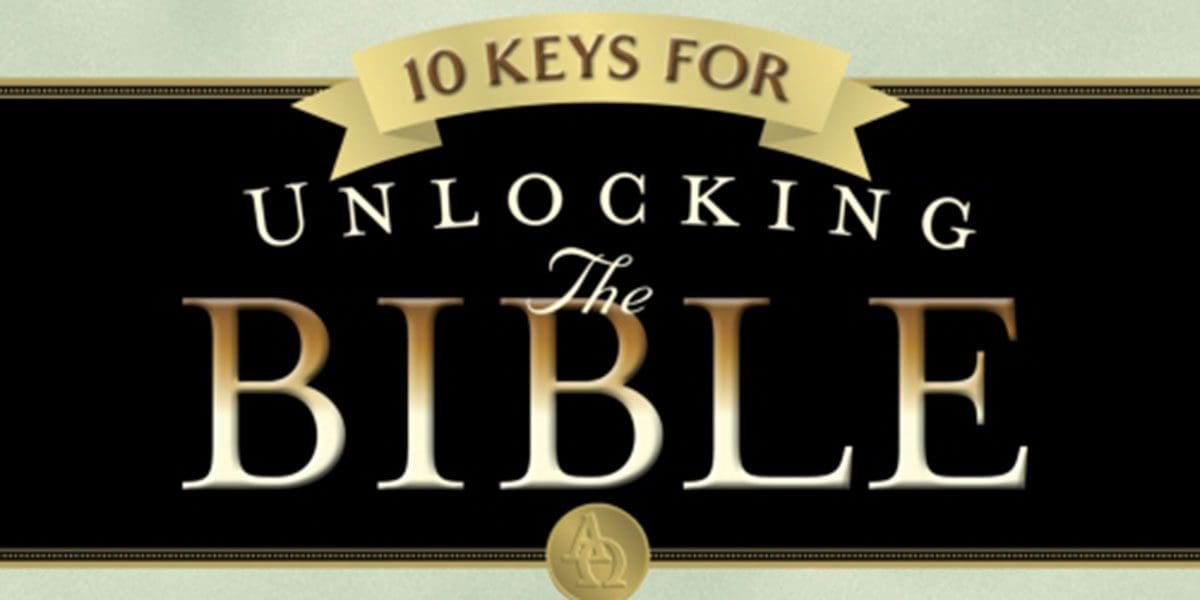The king ordered Joab and Abishai and Ittai, “Deal gently for my sake with the young man Absalom.” (2 Samuel 18:5)
Please open your Bible at 2 Samuel 18. This is the last message in our series on the life of David—for now. Clearly, we have not reached the end of David’s life, and God willing, we will come back to this story for a further four weeks in the summer.
One of my memories of English classes in high school is of being given two stories or essays, with the assignment to “compare and contrast” the one with the other. The word “compare” means: to observe the similarities. The word “contrast” means: to point out the differences.
Throughout this series, we have been putting the story of David and the story of Jesus alongside one another to compare and contrast them. Some features of these stories are strikingly similar. Others are obviously very different.
Think for a moment about the comparisons—places where David points directly to Jesus and almost anticipates the Lord Jesus.
1. David is God’s anointed king. David is a man after God’s own heart. Jesus is the Anointed One, the exact representation of his being, the image of God himself.
2. David was despised and rejected, as was our Lord. We saw how David crossed the Kidron Valley, as Jesus did. We have seen him weeping on the Mount of Olives, as Jesus did.
3. David is brought back to Jerusalem later in the story when the great rebellion is crushed. We will see the King return, as Jesus will return in power and glory.
As wonderful as the comparisons are, there is even more that we can learn from the contrasts. The Holy Spirit uses both comparison and contrast to shine his light on the glory of Christ. Today I want you to see the glory of Jesus that shines out from the contrast between David and our Lord.
As we look at David, we are looking at the story of a king with many sins.
A King with Many Sins
It happened, late one afternoon, when David arose from his couch and was walking on the roof of the king’s house, that he saw from the roof a woman bathing; and the woman was very beautiful. (2 Samuel 11:2)
We have seen the painful chain of events that followed David’s sin with Bathsheba. Here are six repercussions that come from sin in the life of God’s children, as David was.
1. The death of Uriah
David gave Uriah, the husband of Bathsheba, a sealed letter to carry to Joab, the commander of David’s army. In this letter, David instructed Joab to put Uriah in the heat of battle, in harm’s way, and then to pull back so that Uriah would be left at the mercy of the enemy. So, effectively, David not only took Uriah’s wife, he also took Uriah’s life.
2. The audacity of Joab
This letter explains why Joab became more and more of a thorn in David’s side in these later years of his life. Joab knew David’s secret. Nobody else knew that David had given the order to put Uriah in the line of fire. But Joab did. He had the letter! And that gave Joab power over David, which he used with increasingly devastating effect to wield power over the man that God had anointed king.
We will see in the story today that, far from being committed to the will of the king, Joab becomes a wild card who no longer takes his lead from David, but feels quite free to follow his own policy, because he has something that he holds over David.
3. The loss of Ahithophel
We have followed the story of Ahithophel, who for years had been David’s strategist and closest adviser. This man was a fount of wisdom. His counsel was as the word of God (2 Samuel 16:23). But Ahithophel was the grandfather of Bathsheba, and part of the price David paid for his sin was that he lost the confidence and support of his most trusted adviser.
4. The suffering of Tamar
We saw how David’s daughter Tamar was horribly abused by her own stepbrother Amnon. David’s sexual sin repeats itself in his own family, in an uglier form, by his own son. A father can have no greater sorrow than to see his own sins being repeated in the lives of his children.
5. The death of Amnon
We saw how David’s son Absalom took vengeance on Amnon for what Amnon had done to their sister. David had ordered the elimination of Uriah. Now Absalom ordered the elimination of Amnon.
The word of Nathan the prophet was coming true: “The sword shall never depart from your house” (2 Samuel 12:10). David found that he was living under the discipline of God as these repercussions tore through his family and through the entire nation, leaving a trail of pain and destruction behind.
6. The rebellion of Absalom
David loved Absalom with all his heart, but Absalom does not love David. Absalom was a rebel. He hated God and he hated his father. He lures the people away from their loyalty of David, and he leads this great rebellion that splits the nation.
The death of Uriah, the audacity of Joab, the loss of Ahithophel, the suffering of Tamar, the death of Amnon, the rebellion of Absalom: This was the devastating trail of destruction. Why is it in the Bible? It is there to say, “When you are tempted, think very carefully about the destruction that will come in its wake.”
Again and again in the life of David, we are faced with disappointment that leaves us saying, “We need a better king than this.”
Who would have thought—the young hero who killed Goliath, the skilled leader who wonderfully brought God’s people together and pushed back their enemies, the king described as a man after God’s own heart, the man who was so filled with the Holy Spirit that he wrote Scripture under the direct inspiration of God—who would imagine that David would turn out to lead his family and his people into such bitter sorrow and loss?
Hope springs eternal in the human heart and when David came to the end of his life. There were high hopes that his son Solomon might be the king who would live according to all the commands of God. Solomon, like David, started brightly. But if you read the story of his life, you will find the same pattern—bright beginnings, sad endings.
From that time on, it’s pretty much downhill for the rest of the Davidic kings. None of the rest come close to the achievements of David and Solomon. All of them carry exactly the same bent to sin.
So we read through this story and we ask: Where will we ever find a king who is all that God calls us to be? This gets to the heart of the human problem. None of us can or will fulfill all that God has called us to be and to do. The most gifted person in this room cannot do it. The most godly person in this room has not done it.
We are sinners by nature and practice. We are sinners in thought, and word, and deed. All have sinned and fall short of the glory of God (Romans 3:23). That is the human condition. It’s true in every culture, and every generation. It’s true of women and men, rich and poor, black and white. It’s the universal truth of all of us.
David was a king with many sins and his story leaves us looking for a better king.
A King Who Cannot Save
Then David mustered the men who were with him and set over them commanders of thousands and commanders of hundreds. (2 Samuel 18:1)
Ahithophel had advised Absalom to pursue David immediately. David only had a small band of supporters when he left Jerusalem. And if Absalom had taken Ahithophel’s advice, he surely would have succeeded.
But God used a spy by the name of Hushai to save the life of David. Hushai advised Absalom to raise a vast army from north, south, east, and west. And he advised Absalom that he should be the one to lead them into battle. This meant a delay, and during that time thousands came to stand with David.
So in chapter 18, we have two armies ready for battle. David has three commanders: Joab, Abishai, and Ittai, the loyal soldier who we met earlier in the story.
David wanted to go into battle with them: “I myself will also go out with you” (2 Samuel 18:2). But his loyal people won’t let him go. “You are worth ten thousand of us” (v.3). Isn’t that beautiful? That’s loyalty. Your life is so valuable; it cannot be put at risk!
David accepts their counsel but what he says next tells us why he was so eager to go with the army: “Deal gently for my sake with the young man Absalom” (v.5).
David could hardly have made this instruction clearer, and the order was issued in the strongest possible terms. He ordered Joab, and Abishai, and Ittai face-to-face, and eyeball-to-eyeball: Whatever happens, I don’t want harm to come to Absalom!
Then David gave this command publicly: “All the people heard when the king gave orders to all the commanders about Absalom” (v.5). Everyone knew the king’s orders.
And notice that the king gave the highest possible reason: “Deal gently for my sake with… Absalom” (v.5). This is personal. Do this for me. Make sure you don’t mess this up. I want Absalom coming home alive.
“The army went out into the field against Israel, and the battle was fought in the forest of Ephraim” (v.6). In the course of this battle, we are told that, “Absalom happened to meet the servants of David” (v.9).
As soon as he saw them, Absalom would have turned and fled. “Absalom was riding on his mule, and the mule went under the thick branches of a great oak, and his head caught fast in the oak, and he was suspended between heaven and earth, while the mule that was under him went on” (v.9).
So Absalom was hanging on a tree. His head caught in a forked branch, and the mule gone from beneath him. Then we are told that “A certain man saw it and told Joab, ‘Behold, I saw Absalom hanging in an oak’” (v.10).
The significance of the tree is that in the New Testament we read: “Cursed is everyone who is hanged on a tree” (Galatians 3:13 citing Deuteronomy 21:23). Absalom was the rebel son of David, and he was clearly under the curse of God.
Joab said to the man who saw Absalom hanging from the tree, “Why then did you not strike him to the ground? I would have been glad to give you 10 pieces of silver” (2 Samuel 18:11).
The man (who is never named) says to Joab, “Even if I felt in my hand the weight of a thousand pieces of silver, I would not reach out my hand against the king’s son, for in our hearing the king commanded you and Abishai and Ittai, ‘For my sake protect the young man Absalom’” (v.12). My king wants to save his son, and I would not betray the trust of my king for 1,000 pieces of silver!
But Joab will have none of that: “I will not waste time like this with you” (v.14). He despises this man. “Get out of my way!” Joab is the commander. He has the king’s letter about Uriah. What does he care about the will or the word of the king?
So Joab goes with his ten armor bearers and puts Absalom to death. And here is the point: David can do nothing to stop it. He is the king, and yet even he cannot save his own son.
Then Joab and his men threw Absalom’s body into a pit in the forest “and raised over him a very great heap of stones” (v.17). Jewish writers speak of a tradition that emerged in the following years in which people who passed by would throw a stone on the heap and say, “Cursed be Absalom, and cursed be all who rise up in rebellion against their parents.” [1]
David was a powerful king. He could slay Goliath, but he could not save his own son. Even when he gave the clearest, strongest public command and most personal order: “Do this for my sake,” he could not get it done.
David was a king whose word proved powerless, and his story leaves us looking for a stronger king.
A King Who Cannot Become a Substitute
What follows is the story of how news of triumph in the battle came to David. A man by the name of Ahimaaz, who was a loyal servant of David and a very fast runner, wanted to bring the news of his army’s triumph to the king. But Joab doesn’t want him to go. He knows that David will have more sorrow over the death of his son than joy in the victory of his army, and he wants to protect Ahimaaz from bringing this dreadful news.
So Joab sends a Cushite—an African who emerges as a hero in the story. But Ahimaaz won’t take ‘No’ for an answer, and in the end he persuades Joab to send him too. He goes by a longer route, but gets there faster, and so is the first to break the news to David.
“All is well,” he says to the king (2 Samuel 18:28). “Blessed be the Lord your God, who has delivered up the men who raised their hand against my lord the king” (v.28). The victory is won. The war is over. The rebellion is ended.
But the king’s mind is on just one thing: “Is it well with the young man Absalom?” (v.29).
Ahimaaz knew that Absalom was dead. That was the reason Joab gave him for not being the one to carry the news (v.20). Ahimaaz wants to be the announcer of good news. But he bottles out from telling what will be difficult for David to hear. “I saw a great commotion, but I do not know what it was” (v.29).
David says, “Turn aside and stand here” (v.30)—the supreme irrelevance of a messenger who announces good news, but does not have the courage to speak the truth when it is uncomfortable to hear. You’re not a messenger I want to listen to. Just stand over here.
The Cushite shows up and tells the whole story. The victory is won. The rebellion is over. Absalom is dead.
Then we come to verse 33: “And the king was deeply moved and went up to the chamber over the gate and wept. And as he went, he said, “O my son Absalom, my son, my son Absalom! Would I had died instead of you, O Absalom, my son, my son!” (v.33).
Do you see what David is saying? “Absalom, if only I could have taken your place, if only I could have been the one hanging on that tree instead of you, if only it was me under that pile of stones and not you. If I could have substituted myself for you, I would have done it.”
“Absalom, my son, my son, would that I had died instead of you!” David loved his son more than he could put into words. But David could not become a substitute for Absalom.
Put the whole story together and see what we have in David. He was Israel’s greatest king. But here is a king with many sins, here is a king who cannot save, here is a king who cannot take the place of the rebel son that he loves. The story leaves you saying, “We need a better king than this!”
Five Contrasts That Shine a Light on the Unique Glory of Jesus
So this story points to our Lord Jesus Christ by way of contrast: Here are five contrasts that shine a light on the unique glory of our Lord Jesus Christ.
1. The sin
Roll the story forward a thousand years and David’s greater Son comes into the world, born into David’s line. Here’s the contrast: David is a king with many sins. Jesus committed no sin, neither was deceit found in his mouth (1 Peter 2:22). Jesus was the only person in all of human history who perfectly fulfilled the life that God calls all of us to live.
His life is infinitely precious, so how amazing is this: While David stayed back from the battle because his men said, “You are worth 10,000 of us”, Jesus, whose life is infinitely precious, went into battle and laid down his perfect life for us!
2. The silver
“A certain man” (2 Samuel 18:10) was so loyal to his king that he said that even for 1,000 pieces of silver he would not give up the son of David. But in the New Testament there is another man, a man whose name we do know, who professed to be loyal to Jesus, but for just 30 pieces of silver, he gave up the Son of God.
3. The tree
Anyone who is hung on a tree is under God’s curse (Deuteronomy 21:23, Galatians 3:13). Absalom was hanging on a tree. And Jesus also was hanging on a tree. But here’s the contrast: Absalom hung under the curse of his own sin. Why was Jesus on the tree? Jesus came under the curse that was due to us. He was there for you and me.
The apostles often referred to the cross as a tree precisely to make this point: “Christ redeemed us from the curse of the law by becoming a curse for us—for it is written, ‘Cursed in everyone who is hanged on a tree’” (Galatians 3:13). Why would the sinless Son of God come under this curse? Peter says, “He himself bore our sins in his body on the tree…” (1 Peter 2:24).
4. The substitute
What David wished he could do for Absalom, Jesus did for us. “O Absalom, would that I had died instead of you” (2 Samuel 18:33).
But here is the contrast: David could not take the place of Absalom, but Jesus stood in our place. He became our substitute. He died our death, and all that was due to us on account of our sins was poured out on him.
He really did die the death that was coming to rebels like us. David said of Absalom, “Would that I had died instead of you.” Jesus can say, “I did die instead of you!’
5. The stones
Absalom was buried under this enormous pile of stones! When the body of Jesus was taken down from the cross, he was laid in a tomb and a great stone was rolled over the entrance.
But here is the contrast: The body of Absalom remained under that awful pile of stones. It never moved. But the body of Jesus was raised up in triumph and the stone was rolled away!
It is because of Jesus, our risen Savior, that there is hope for sinners like David and sinners like you and me. The king with many sins was able to say, “The Lord is my shepherd. I shall not want. He restores my soul and leads me in paths of righteousness” (Psalm 23:1, 3).
Through Jesus you can say that too. Jesus saves sinners like David and like us because he did what David could never do (and what no one else can ever accomplish). He stood in our place. He became our substitute. He bore the curse for us, and when it was done, he rose in triumph from the grave, leaving the stone behind.
[1] Matthew Henry, Commentary on the Whole Bible, p. 371, Hendrickson, 2008.
[elementor-template id=”128476″]






